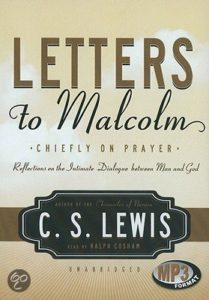 Another C. S. Lewis book that I read recently—for the first time—is Letters to Malcolm: Chiefly on Prayer. One section speaks directly to me with respect to a hard time I’m going through at the moment.
Another C. S. Lewis book that I read recently—for the first time—is Letters to Malcolm: Chiefly on Prayer. One section speaks directly to me with respect to a hard time I’m going through at the moment.
We would like the world to be predictable, something we can manage according to our expectations. Lewis says we have to lay that expectation aside:
But is it not plain that this predictable world . . . is not the world we live in? This is a world of bets and insurance policies, of hopes and anxieties, where “nothing is certain but the unexpected” and prudence lies in “the masterly administration of the unforeseen.”
Nearly all the things people pray about are unpredictable: the result of a battle or an operation, the losing or getting of a job, the reciprocation of a love. We don’t pray about eclipses.
Therefore, despite our faith, we can’t avoid the potential anxieties life throws at us. Lewis seeks, though, to distinguish between anxiety and sin:
Some people feel guilty about their anxieties and regard them as a defect of faith. I don’t agree at all. They are afflictions, not sins. Like all afflictions, they are, if we can so take them, our share in the Passion of Christ.
 Jesus, Lewis reminds us, had to suffer anxiety in order to be fully human. His prayer in the Garden of Gethsemane prior to the crucifixion, held the hope, however slim, that He might not have to go through with it:
Jesus, Lewis reminds us, had to suffer anxiety in order to be fully human. His prayer in the Garden of Gethsemane prior to the crucifixion, held the hope, however slim, that He might not have to go through with it:
Lest any trial incident to humanity should be lacking, the torments of hope—of suspense, anxiety—were at the last moment loosed upon Him—the supposed possibility that, after all, He might, He just conceivably might, be spared the supreme horror.
If Jesus hadn’t sweat blood in the Garden, “perhaps He would not have been very Man. To live in a fully predictable world is not to be a man.”
Lewis concludes these thoughts with this:
We all try to accept with some sort of submission our afflictions when they actually arrive. But the prayer in Gethsemane shows that the preceding anxiety is equally God’s will and equally part of our human destiny. The perfect Man experienced it. And the servant is not greater than the master. We are Christians, not Stoics.
Who am I to think that I should be allowed a lifetime full of completely manageable, totally predictable moments? That expectation would place me above my Master.
I like Lewis’s final sentence very much. The Stoics attempted to glide through life unaffected by anything bad that happened. They sought to so completely control their emotions that nothing bothered them. That is unrealistic.
Christians should not expect to be unaffected by the sin and misery that are the common lot of us all, redeemed and unredeemed alike. What we have that the unredeemed do not is a Savior we can look to who knows what it is like to experience similar anxieties. He was fully human, even as He was fully God. He can come to our aid in our darkest hours.
